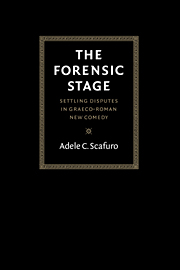Book contents
- Frontmatter
- Contents
- Preface
- Author's note on terminology, transliteration, translation, and texts
- List of abbreviations
- Introduction
- PART I PRE-TRIAL PLAYS
- PART II RECONCILIATION AND ITS RHETORIC
- 3 Arbitration and reconciliation in Athens and Rome
- 4 Scenarios of arbitration and reconciliation in New Comedy
- 5 Redress for sexual offenses in Athenian and Roman law
- 6 The resolution of seduction and rape in New Comedy
- 7 Arguing behind closed doors
- PART III PLAYING ON THE BOUNDARIES OF THE LAW
- APPENDICES
- Works cited
- General index
- Index locorum
5 - Redress for sexual offenses in Athenian and Roman law
Published online by Cambridge University Press: 03 March 2010
- Frontmatter
- Contents
- Preface
- Author's note on terminology, transliteration, translation, and texts
- List of abbreviations
- Introduction
- PART I PRE-TRIAL PLAYS
- PART II RECONCILIATION AND ITS RHETORIC
- 3 Arbitration and reconciliation in Athens and Rome
- 4 Scenarios of arbitration and reconciliation in New Comedy
- 5 Redress for sexual offenses in Athenian and Roman law
- 6 The resolution of seduction and rape in New Comedy
- 7 Arguing behind closed doors
- PART III PLAYING ON THE BOUNDARIES OF THE LAW
- APPENDICES
- Works cited
- General index
- Index locorum
Summary
Unlike arbitration, which has received relatively little scholarly attention in the last decades, sexual offenses in Athens and Rome have been subjected to prodigious scrutiny. In an area where ancient men and women were ashamed to speak, contemporary scholars have filled the gap. Modern treatments of the subject have tended to focus upon lawful sanctions against sexual offenders. Playwrights of New Comedy, however, in their frequent employment of plots touching upon sexual violations, dramatize extra-judicial settlements. They present us with the interstices of the law rather than with episodes of courtroom drama. Their focus of attention is not surprising: the Athenian forensic record turns up only one reliable attestation of an offender who is brought to court for the sexual violation of a woman. Athenians preferred to settle out of court. The scenarios dramatized by New Comedy playwrights might therefore contribute to our understanding of the ways in which sexual offenses were, in practice, redressed in Athens. Interpretation of these scenarios, however, requires familiarity with legal terrain.
While New Comedy's terminology of sexual violation and evidence for penalties are combined cautiously with evidence from the orators in this chapter, the more fully blown comic scenarios are reserved, in general, for treatment in chapter 6. A methodological issue that underlies the agenda of that chapter, however, must be brought to the surface here: is it really possible to use New Comedy as a source for establishing the ways in which Athenians treated rape and seduction in their own society? How can we distinguish social realities from genre motifs? As in treating other substantive offenses and remedies, parallels must be sought from the orators.
- Type
- Chapter
- Information
- The Forensic StageSettling Disputes in Graeco-Roman New Comedy, pp. 193 - 231Publisher: Cambridge University PressPrint publication year: 1997



